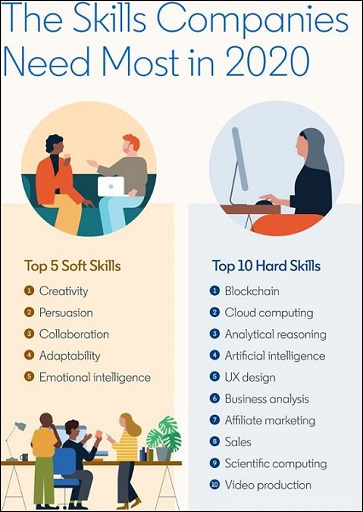Social network LinkedIn has crunched the numbers to come up with the most in-demand skills of this year, with IT skills ranking highly.
Cloud computing, AI, and UX design are among the top five, but this year’s most wanted hard skill seemingly came out of nowhere – blockchain.
LinkedIn says that the US, UK, France, Germany, and Australia are the countries where blockchain skills are most in-demand, and the technology has already been adapted for areas like agriculture, finance, and even the lottery.
But are blockchain experts really as demanded as LinkedIn thinks?
Although he is bullish about blockchain in general, Halcyon Knights recruitment consultant, Ryan Gray, is skeptical about the immediate need for Australian blockchain experts.
“I definitely believe it has room to grow in Australia, but I don’t see [blockchain] outpacing the need we’re seeing in other disciplines, like cyber security or analytics, within the next 12 months,” Gray told Information Age.
“While ‘Blockchain Management’ is being recognised as a viable career for skilled migration to Australia, I don’t see signs of demand outweighing the available supply of people actively engaged in the blockchain community.”
2020's top skills are all about sales and technology. Source: LinkedIn
Gray said recruiting for blockchain skills is different to finding people with more specific skillsets.
“It means looking for people who have an approach to problem solving that uses the idea of the digital ledger as a launch point to meet a number of business challenges,” he said.
“We’ve recruited developers for Australian cryptocurrency exchanges, but also lead searches for salespeople that understand the technology and its applications.
“While the talent pool itself isn’t very large just yet, there are many different kinds of professionals with ‘blockchain skills’ that we work with.”
Can you explain blockchain?
Blockchain 2030 – a report published last year by ACS and Data61 – shows that blockchain-related online job postings grew from 500 in 2014 to nearly 4,000 in 2017, and in the first quarter of 2018, blockchain was the fastest-growing skill on freelancing site, Upwork.
The surge in interest for blockchain rose along with its most well-known product, Bitcoin. Since the cryptocurrency’s epic price crash in early 2018, interest has waned.
But the initial spark of innovation has helped drive the technology forward.
Data61 research officer, Dr Alexandra Bratanova, said Bitcoin introduced blockchain technology to the world, and the task for organisations now is about demonstrating appropriate use-cases.
“As the technology is going down the Gartner Hype Cycle, we are seeing companies and organisations trying to figure out what problems can and can’t be solved with it, and in what ways it’s most efficient,” Dr Bratanova told Information Age.
Communicating blockchain’s value – which can often be disruptive for organisations – is a task that Dr Bratanova sees as increasingly valuable.
“The beauty and the great strength of blockchain technology is the network,” she said.
“If you look at it in this way, soft skills are so crucial to get it marketed well, to get it communicated well, to get it understood well, and to get everyone on-board.
“The concept of distributed ledgers, distributed datasets, distributed ownership is very complex, and that is one of the reasons why there are a lot of companies coming into the market providing educational and consulting services about blockchain.”
Research fellow at RMIT University’s Blockchain Innovation Hub, Dr Darcy Allen, agreed that since the technical aspects of blockchain technology are continuing to mature, there is a growing field of thought about how to integrate blockchain into pre-existing structures.
These skills are developed by people in industries that have traditionally sat outside of IT.
“This technology was invented around 2009 but the question still is, ‘How does this tech change what an economy looks like in the future?’” Dr Allen told Information Age.
“We also see questions around ‘What are the implications for law?’ and ‘What do accountants do in a blockchain world when you have to audit ledgers?’
“So I think that, while there’s a lot of headlines promoting the need for blockchain developers – and that is very important of course – there’s also a whole range of other blockchain skills that are about trying to understand how does this tech integrate into an economy, and how large corporate firms can use this technology.”











